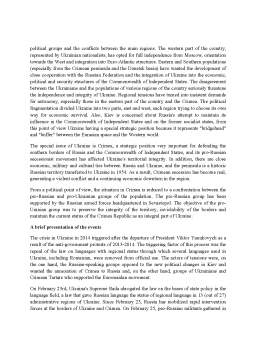Extras din referat
On February 27, 2014, Russian military forces with no national, unitary or individual signs, along with local pro-Russian paramilitary forces, occupied key points in Crimea and Sevastopol, the capital of the region. This was the beginning of the Ukrainian crisis, which soon became a military conflict between Ukraine and the Russian Federation. On 18 March 2014, Russia officially annexed the Crimea, taking note of the result of an illegal referendum organized by the separatist authorities in the region.
At present, the crisis in Ukraine is the biggest threat to European security since the end of the Cold War.
It is very important to understand the implications of this crisis. Those who have watched the way how this conflict has evolved, have understood, since the spring of 2014, that it would be a long-term or medium-term crisis. The conflict has been evident in a latent state. The armistice does not work as it was written on the paper. Experts who monitor compliance with the arrangements agreed in the conflict negotiation formats continue to find violations of the conflict. For instance, on 1 March 2016, 35 cases of violation of the armistice were recorded. The most active areas, in terms of weapons use and violation of the armistice provisions, remain Donetsk and Lugansk, especially near the airport in the city of Donetsk.
In situations where large-interest actors are involved, theory and practice are incompatible most of the time. Strategies adopted have served a limited number of objectives and interests, and those who have formulated them are hardly convinced to give up. So the situation remains as tense. The parties are not ready to give their opponents much room for maneuver.
There are many things to consider: some struggles to restore territorial integrity, others not to reach the bank of the accused for crimes committed against humanity or against the state.
Today, Europe, after learning lessons from the dark past of world wars, is founded on the principle of respect for international law. It is confronted with a conflict that recalled the tragic memories of periods of long gone, in which democracy and freedom could not be considered by themselves.
The military conflict in Ukraine's eastern rusophone demonstrates the geopolitical reality that the Kremlin sees NATO approaching its borders, which it sees as humiliating. From the point of view of Dominique David, Executive Director of the French Institute for International Relations (FIIR) the Russian Federation has strongly planned to block the Euro-Atlantic system near its borders by controlled convulsions seen at the time of the annexation of Crimea and the dynamics of the Donbass conflict. The image of an imperialist Russia became dangerous to the West because it hesitated to accept democratic modernity and became reactive in its relationship with Western European states that it considered them irresponsible. For Europe, none of its large geopolitical actors have the intention of sinking Russia into a deep crisis, but it is necessary to re-evaluate and recompense forces with the Kremlin. But it is desirable to recompose the values between the West and the East. A Russia that is distant from the values behind the Commonwealth would be a failure for the West. According to Dominique David, the origin of the Ukrainian conflict is in the bad political and economic management of the time of the USSR disintegration in 1991, so Ukraine's international status should not only take into account the Russian heritage of economy and culture. The choice of the West option by Kiev must guarantee the independence and integrity of the Ukrainian borders and at the same time ensure a cooperative relationship between Moscow, Brussels and Kiev. Dominique David believes that for Ukraine, the West is the only option to help it govern and eliminate the problems that have arisen in corrupt governments over the last twenty years. For Ukraine's prosperity, it is necessary for the big European geopolitical actors to secure an international acceptable status for it and to negotiate with Moscow at all times.
Historical determinations that generated the geopolitical crisis in Ukraine
Preview document
Conținut arhivă zip
- The crisis in Ukraine.docx













